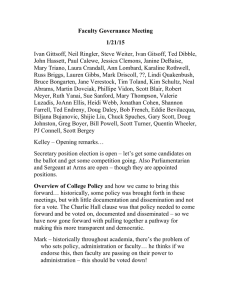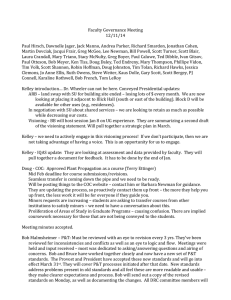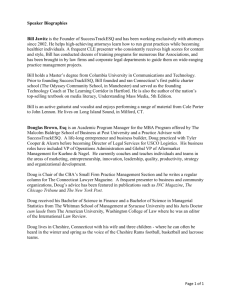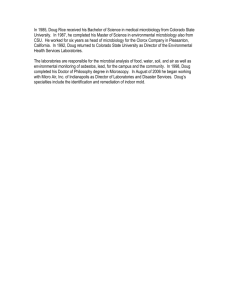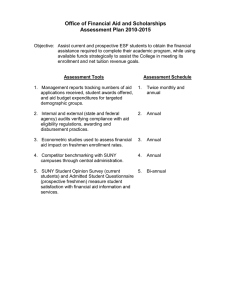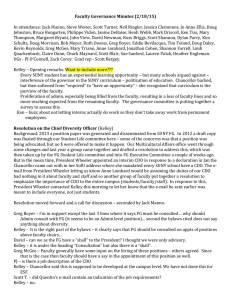College Wide Governance Meeting AGENDA
advertisement
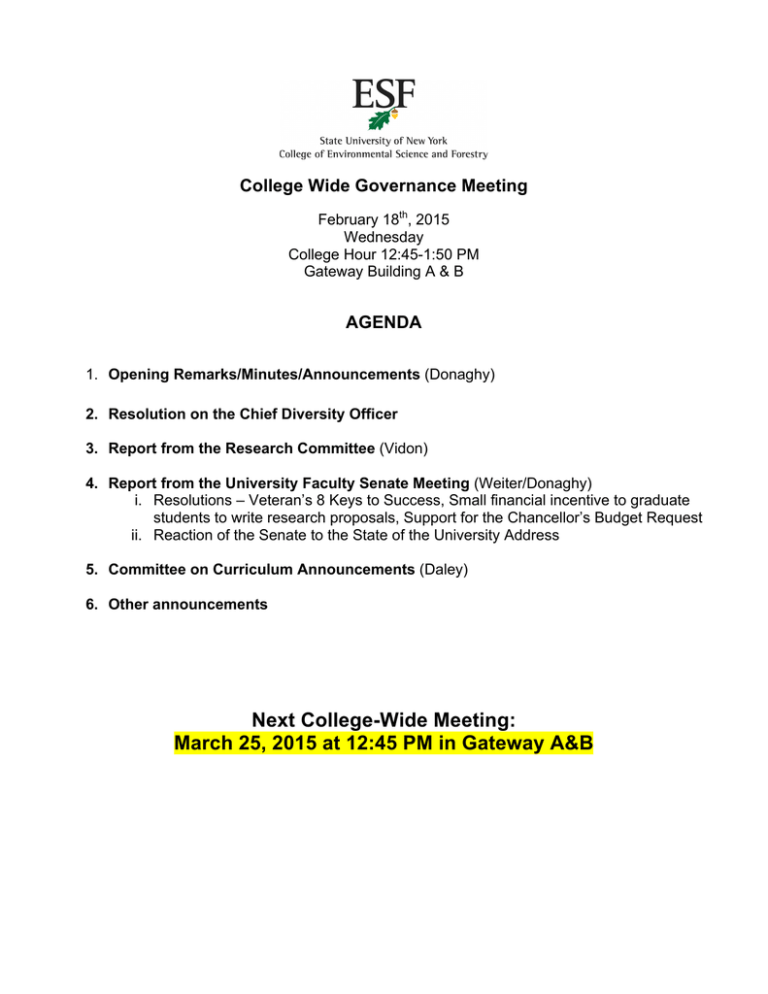
College Wide Governance Meeting February 18th, 2015 Wednesday College Hour 12:45-1:50 PM Gateway Building A & B AGENDA 1. Opening Remarks/Minutes/Announcements (Donaghy) 2. Resolution on the Chief Diversity Officer 3. Report from the Research Committee (Vidon) 4. Report from the University Faculty Senate Meeting (Weiter/Donaghy) i. Resolutions – Veteran’s 8 Keys to Success, Small financial incentive to graduate students to write research proposals, Support for the Chancellor’s Budget Request ii. Reaction of the Senate to the State of the University Address 5. Committee on Curriculum Announcements (Daley) 6. Other announcements Next College-Wide Meeting: March 25, 2015 at 12:45 PM in Gateway A&B Faculty Governance Meeting 1/21/15 Ivan Gittsoff, Neil Ringler, Steve Weiter, Ivan Gitsoff, Ted Dibble, John Hassett, Paul Calewe, Jessica Clemons, Janine DeBaise, Mary Triano, Laura Crandall, Ann Lombard, Karaline Rothwell, Russ Briggs, Lauren Gibbs, Mark Driscoll, ??, Lindi Quakenbush, Bruce Bongarten, Jane Verestock, Tim Toland, Kim Schultz, Neal Abrams, Martin Dovciak, Phillipe Vidon, Scott Blair, Robert Meyer, Ruth Yanai, Sue Sanford, Mary Thompson, Valerie Luzadis, JoAnn Ellis, Heidi Webb, Jonathan Cohen, Shannon Farrell, Ted Endreny, Doug Daley, Bob French, Eddie Bevilacqua, Biljana Bujanovic, Shijie Liu, Chuck Spuches, Gary Scott, Doug Johnston, Greg Boyer, Bill Powell, Scott Turner, Quentin Wheeler, PJ Connell, Scott Bergey Kelley – Opening remarks… Secretary position election is open – let’s get some candidates on the ballot and get some competition going. Also Parliamentarian and Sergeant at Arms are open – though they are appointed positions. Overview of College Policy and how we came to bring this forward… historically, some policy was brought forth in these meetings, but with little documentation and dissemination and not for a vote. The Charlie Hall clause was that policy needed to come forward and be voted on, documented and disseminated – so we have now gone forward with pulling together a pathway for making this more transparent and democratic. Mark – historically throughout academia, there’s the problem of who sets policy, administration or faculty… he thinks if we endorse this, then faculty are passing on their power to administration – this should be voted down! Bruce – this SUNY policy and we have to do it like this and make it clear that faculty should have input but ultimately the President has the last say. Kelley – right now we do not have control over this at all, this gives us an avenue to provide feedback and have a voice. The executive cabinet has to consult with the executive chair in this process, there is no written policy that this must be done now. It’s a start. Bruce – SUNY vests all power in the President while the Chancellor vests Board of Trustees with the power. This is trying to make sure the faculty do have an appropriate voice. Vote: All “ayes” except for one “nay” Action item! “effect” should be “affect” in the document (Paul Caluwe) Kelley - overview of IQAS work: End of the course surveys – problems with getting students to do them, problems with formatting, questions not always appropriate, and no way to add questions easily, etc. Scott Shannon found a group (IAS in Washington) who would work with us for a reasonable price and a free semester trial – these surveys would offer multiple formats instructors could choose from for their type of class (studio, big class, etc). IQAS approved this, but then found computer bridges would need to be made for it to work - hopeful this will come to fruition soon. GenEd Assessment – they’ve been working on this full time, working on rubrics and recommendations about the process. Overview of an excel sheet with student learning outcomes. Recommendations were to tell the faculty what these are so they can have these in mind. Develop a checklist for faculty. All majors should have a capstone – a good site is eportfolio for student work. Also, create a more general education program to – IQAS is not the group to oversee the GenEd program, but it does need to be faculty led, not top-down. A draft will be available for all of us to review soon. Doug – how did the committee come to the conclusion that a capstone is necessary? Kelley – Upon considering many options, capstones seemed to be a good way to follow the threads, e.g., ethics, etc., and document outcomes through many courses. Doug – what other methods did you evaluate? Kelley – we looked at exams ?s and final papers, but again, the committee settled on capstones being the best. Doug – I contributed to this assessment and would like to know what the results were from what I contributed – will I be expected to change my course based on evaluation of the documents? K – not necessarily, the outcomes are owned by the faculty and the college as a whole. Valerie – this is not faculty or a program assessment or a student – it is college level… it won’t come back to individual faculty. D – as an instructor I shouldn’t care? V - it is an institutional level assessment. Kim – are these individual or group/major capstones? K – there wasn’t a difference in whether it was one or the other, we/the college just needs some indication that certain outcomes were met, e.g., scientific method used, take to a higher level (community), etc. Kim – how will these be funded? For large majors, this might be a problem, e.g., Envir Science. K – thought it would be a good idea that all students do capstones. Suspensions: Lindi was Academic convener for suspensions (111 brought up, 18 suspended, 8 appealed, 3 upheld). Lindi – we need more communication as these may impact other students. Scott – Student Life Scott Blair - Update on alcohol policy: Changes in alcohol policy are in effect to bring us into compliance with state law. Also, there were slight modifications to student code of conduct in regards to alcohol. Kelley – when is policy finished? Ann – there are two policies and they are ready to go forward Doug – Committee on Curriculum Two meetings since last met in Dec. Minor modifications to one course (e.g., change of semester taught) and a new course was approved after a spirited discussion about shared resource courses – pay particular attention to learning outcomes being appropriate for the course number selected and distinctions of 400/600 and 400/500 and 300/500 levels. If you are not sure, talk with them – focus on outcomes and on methodologies – we need to make sure that graduate students actually get a graduate level course. These shared are a necessity considering our size and in times of tough cash flows. A new policy is coming and will be posted for review – for a minor, ½ the credits (50%) need to be taken while a matriculated student and are letter graded (some can be transferred from another college). If you have an opinion on this, please share it. Updated procedures… also, there has been a proliferation of majors for grads, marketing tools? Providing guidance? If we start using these to mandate, then they become curriculum matters. Urge judicious and limited use of proliferation of “areas of study”, if I don’t take that, then can I not get that degree? Val – for the grad program in ES, which has very different requirements, for areas of study, is this changing this? Paul (very concerned look) Val – PhD in ??? and Ruth – window dressing, one study has more requirements Val – it is an area of study and did go through CC Doug – these meet the overarching requirements? They all have to do a plan of study? What do you do with someone who doesn’t want to? Val – if you want curricular requirements for an area of study then it has to go through CC? Doug – the area of study does not show up on diploma? Val - Yes, it does. Doug - MP oversees this and it should be on the study plan. Val – this was purposefully designed to mitigate quality of advising and make them all the same… but there is variation from committee to committee and what they require. Doug – a group of interested faculty got together and agreed on these requirements? Val – Yes. Ruth – we no longer have to bring forward “marketing” changes, only if requirements are put in place or Bruce – if a program wants to create a new “area of study” they don’t have to go through the CC? Doug – no… just marketing and these can be added/deleted/changed without passing through the CC Bruce – problem – these areas of study appear in the catalog? Doug – yes. Bruce – everything in the catalog HAS to go through the CC. Action item! Doug – O.K. Sigh. Ruth – we need a college-wide review of these different areas of study – it is confusing! Maybe the grad council? Someone needs to do something – product clutter. Action item! Kim - ??? policy… sometimes the best way to fulfill a minor is a study abroad and this limits things. Doug – that was a heads up to talk about this, please provide those comments when it goes up for review. Sue – the Sea program would work? Kim – not an ESF course… New flow chart on the CoC website to follow… follow the steps to see what you need to do! Faculty Governance Resolution No: _______________ A RESOLUTION of the SUNY College of Environmental Science and Forestry Faculty Governance CONCERNING the Appointment of the Chief Diversity Officer WHEREAS there has been and continues to be considerable discussion within SUNY and the University Faculty Senate (UFS) to increase awareness and intentionality of diversity related initiatives on its campuses through the “Making Diversity Count” campaign; and WHEREAS the SUNY Chancellor has called for, in her January 2015 State of the University address, every campus to appoint a Chief Diversity Officer (1); and WHEREAS the ESF President has recently appointed an interim Chief Diversity Officer in response to the Chancellor’s request; HOWEVER, WHEREAS the current Interim Chief Diversity Officer’s description as per the ESF President’s email of Monday, February 9, 2015, is solely student based; and WHEREAS according to ESF Human Resources, thirty-two percent (32%) of the ESF faculty are women and thirteen percent (13%) of ESF faculty are minorities; and WHEREAS no climate or workforce surveys have been done since the mid-1990’s and that which was done called for increasing awareness of subtleties of discriminatory language and definitions and the designation of an ombudsman to work with faculty, students and staff in all areas related to bias and discrimination (2); and WHEREAS the Chancellors address calls for “a member of the campus leadership team who will work hand in glove with Task Force members to ensure we achieve our goals in recruitment, retention, completion, and success for every member of the SUNY family”(1); THEREFORE BE IT RESOLVED that Faculty Governance at ESF encourages the President to broaden the duties of the Chief Diversity Officer beyond just considerations of student diversity, to reaffirm the importance of College-wide diversity and its inclusion in the College’s strategic plan; and ALSO BE IT RESOLVED that Faculty Governance encourages the President to facilitate the Chief Diversity Officer’s development of a College-wide diversity plan that assesses the current climate for women and minorities, and increases the awareness and the intentionality of diversity related initiatives for students, faculty, staff and administrators; and FINALLY BE IT RESOLVED that the President actively consult with Faculty Governance regarding the appointment of the permanent Chief Diversity Officer in accordance with Faculty Governance Bylaws Section III.B.2. as a Diversity Plan for the campus must include an academic component. (1) Link to SUNY Chancellor’s State of the University Address, January 23, 2015. Section V (A3) specifically addresses the Chief Diversity Officer. http://www.suny.edu/about/leadership/chancellor-nancy-zimpher/speeches/2015-sou/ (2) Widmayer, Patricia and Nestor, William. 1994. Report to the ESF Community on the Climate for Women Initiative: Recommendations for an agenda for leadership. Widmayer and Associates, Inc., Chicago Illinois.
